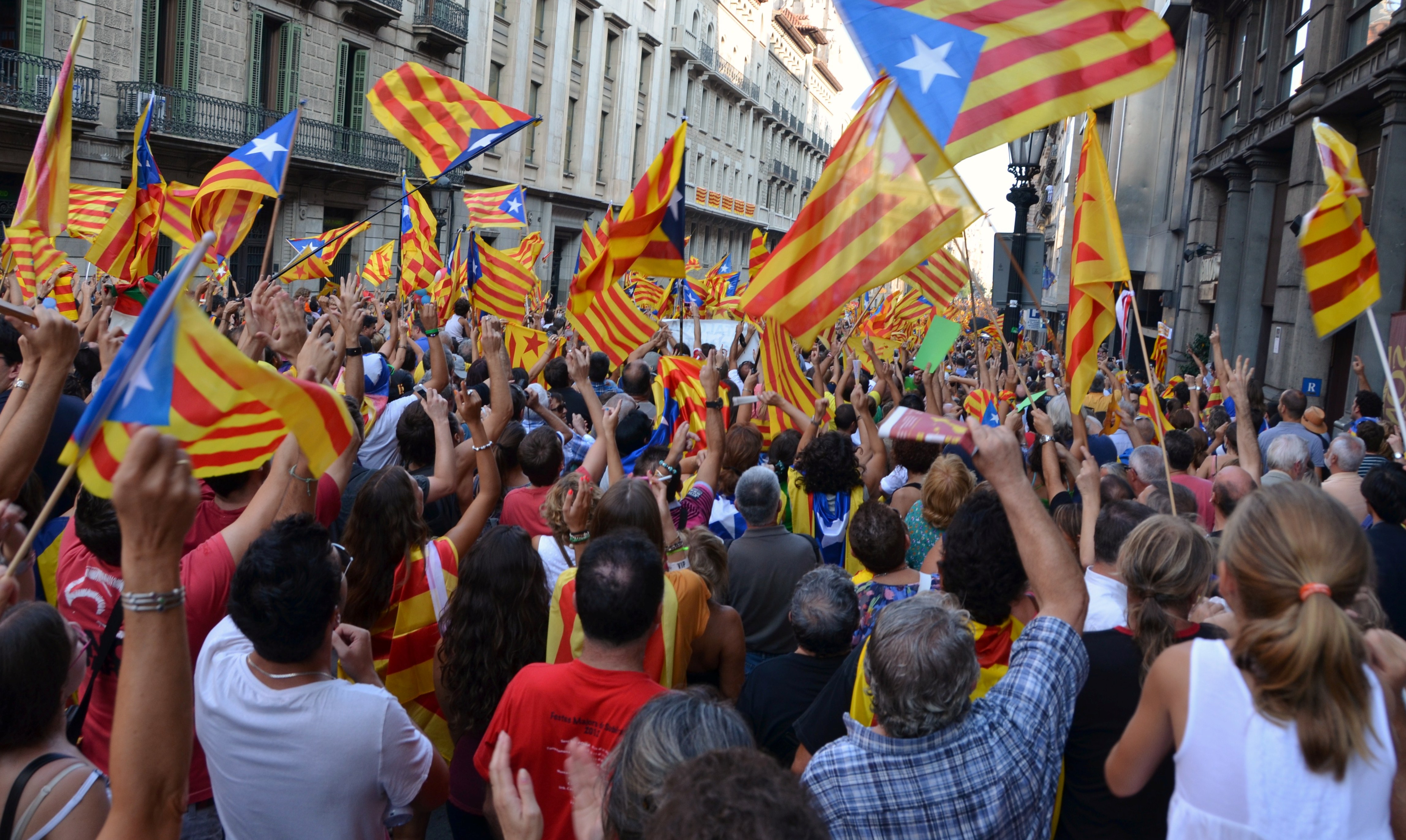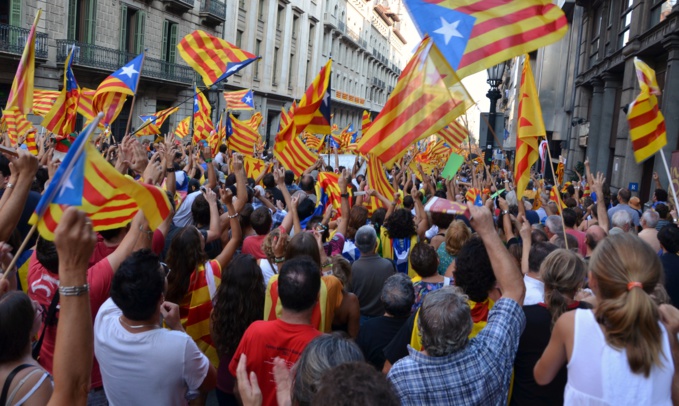"The world's first Internet war began in Catalonia, people and the government are engaged in organizing a referendum on independence, and Spanish intelligence conducts attacks, freezing telecommunications networks, censoring hundreds of sites," he wrote in his Twitter.
Earlier, Madrid blocked 140 resources with calls to support the independence of the autonomous community, including the page of the National Assembly of Catalonia. Assange said that the Spanish Military Police had occupied a telecommunications building in Barcelona and ordered to block 29 applications that the Government of Catalonia uses to organize the referendum. He called on his supporters and technologists from around the world to help expose the methods of work and implementation of censorship of the Spanish police and intelligence in relation to the press, voters and the authorities of the region.
Assange noted that the conflict in Catalonia has become the most significant Western confrontation "between people and the state after the fall of the Berlin Wall." The head of WikiLeaks added that people in 2017 use modern methods, ranging from VPN, proxy servers, "mirrors" and encrypted chat rooms to Internet surveillance, censorship on the network, and propaganda with the help of bots.
On Sunday, the authorities of Catalonia held a referendum on independence. About 90% of Catalans voted for independence from Spain, wrote La Vanguardia on Monday.
At the moment, 2 million 262 thousand ballots have been processed. 2.02 million people (90.09%) vote "for", and 176.5 thousand (7.87%) were "against". 45.5 thousand (2.03%) dropped blank ballots and 20 thousand (0.89%) spoiled them. 15 thousand ballots are yet to be processed.
About 770 thousand people were unable to exercise their electoral right, 400 polling stations were closed.
Earlier it was reported that the regional authorities estimated the turnout at a referendum of approximately 3 million; about 5.3 million people have the right to vote in Catalonia in total. The head of the government of Catalonia, Carles Puigdemont, promised to pass the results of the vote to the parliament for approval. He added that Catalonia defended its right to independence on Sunday.
Meanwhile, Spain's Prime Minister Mariano Rajoy said that the referendum in Catalonia fell through as most of the law-abiding citizens ignored him.
Despite the fact that the official Madrid keeps holding tough positions and is refusing to recognize the referendum, the European Parliament has already made a step towards the "rebels". The vice-president of the European Parliament, the Austrian European MP from the Green Party Ulrike Lunacek called the plebiscite "legal", saying: "As the example of Scotland showed, it should be held in agreement with Madrid." At the same time, the central government must finally stop the blockade of the dialogue." She said she was "shocked" by the fact that the Spanish guards, who report to the government of Rajoy, used rubber bullets, batons and tear gas against Catalan voters. "Together with the Greens faction in the European Parliament, I again call on the European Commission to mediate between the central government of Spain and the Catalan regional government." It is impossible to allow the independence referendum in the 21st century to grow into a state close to civil war," Lunacek said.
In turn, German Chancellor Angela Merkel expressed her support to the Prime Minister of Spain, Mariano Rajoy, and fully approved his position on the referendum.
source: reuters.com
Earlier, Madrid blocked 140 resources with calls to support the independence of the autonomous community, including the page of the National Assembly of Catalonia. Assange said that the Spanish Military Police had occupied a telecommunications building in Barcelona and ordered to block 29 applications that the Government of Catalonia uses to organize the referendum. He called on his supporters and technologists from around the world to help expose the methods of work and implementation of censorship of the Spanish police and intelligence in relation to the press, voters and the authorities of the region.
Assange noted that the conflict in Catalonia has become the most significant Western confrontation "between people and the state after the fall of the Berlin Wall." The head of WikiLeaks added that people in 2017 use modern methods, ranging from VPN, proxy servers, "mirrors" and encrypted chat rooms to Internet surveillance, censorship on the network, and propaganda with the help of bots.
On Sunday, the authorities of Catalonia held a referendum on independence. About 90% of Catalans voted for independence from Spain, wrote La Vanguardia on Monday.
At the moment, 2 million 262 thousand ballots have been processed. 2.02 million people (90.09%) vote "for", and 176.5 thousand (7.87%) were "against". 45.5 thousand (2.03%) dropped blank ballots and 20 thousand (0.89%) spoiled them. 15 thousand ballots are yet to be processed.
About 770 thousand people were unable to exercise their electoral right, 400 polling stations were closed.
Earlier it was reported that the regional authorities estimated the turnout at a referendum of approximately 3 million; about 5.3 million people have the right to vote in Catalonia in total. The head of the government of Catalonia, Carles Puigdemont, promised to pass the results of the vote to the parliament for approval. He added that Catalonia defended its right to independence on Sunday.
Meanwhile, Spain's Prime Minister Mariano Rajoy said that the referendum in Catalonia fell through as most of the law-abiding citizens ignored him.
Despite the fact that the official Madrid keeps holding tough positions and is refusing to recognize the referendum, the European Parliament has already made a step towards the "rebels". The vice-president of the European Parliament, the Austrian European MP from the Green Party Ulrike Lunacek called the plebiscite "legal", saying: "As the example of Scotland showed, it should be held in agreement with Madrid." At the same time, the central government must finally stop the blockade of the dialogue." She said she was "shocked" by the fact that the Spanish guards, who report to the government of Rajoy, used rubber bullets, batons and tear gas against Catalan voters. "Together with the Greens faction in the European Parliament, I again call on the European Commission to mediate between the central government of Spain and the Catalan regional government." It is impossible to allow the independence referendum in the 21st century to grow into a state close to civil war," Lunacek said.
In turn, German Chancellor Angela Merkel expressed her support to the Prime Minister of Spain, Mariano Rajoy, and fully approved his position on the referendum.
source: reuters.com



















